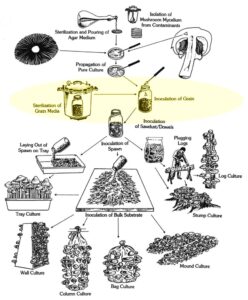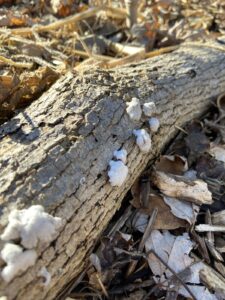Final report for FNC19-1180
Project Information
We have been in operation at our current location since 2018. Three Flock Farm stewards 25 acres in Ellettsville, IN. We practice rotational grass grazing, non gmo feed to our chickens and we never use pesticides or herbicides.
Mushroom cultivation with coffee grounds and spent grain will create a circular economy for small-scale and urban farmers. In pursuit of a no-waste system of food production, mushroom cultivation also provides soil amendment opportunities with composting after harvesting. Mushroom compost can supply nutrients and increase the water holding capacity of the soil. In combination with other plant materials, mushroom compost can be a low-cost solution for soil improvement that meets the needs of the individual farmer. Cooperation between local farmers, brewers and coffee vendors will develop business to business relationships to create a robust economy with shared benefits. The utilization of safe and effective practices for sterilization on a small scale, a workshop to build and maintain vendor-farmer relationships along with data to reflect high yield procedures will ensure that the amateur urban farmers and small-scale farmers can be successful with mushroom cultivation. A decrease in the amount of trash accumulated in the dump and a reduction in trash fees for local businesses are a few of the advantages of mushroom cultivation with spent grain and coffee grounds. Start-up costs and reliable research are barriers to incorporating new growers into the community at large.
Three Flock Farm seeks to determine the highest yield method of mushrooms from spent grain or coffee grounds. In addition, we will observe and seek to determine which varieties flourish from each by-product. Evaluation of sterilization processing will demonstrate the safest and effective practices for small-scale production. We will create and maintain cooperation between farmers, brewers and coffee vendors to dramatically reduce the by-products being put in the trash. Three Flock Farm will provide education and resources to bolster community organizations including Mother Hubbard cupboard food pantry, Bloomington orchard, and Bloomington Parks and Recreation garden plot programming.
Cooperators
Research
Our processing will take place in-house in a closed environment for sterilization. Grain and coffee grounds will be picked up as close to the end of production as possible to avoid bacteria growth. Sealed plastic bins will transport the by-product to our facility. After the sterilization process, inoculation will take place in jars in order to avoid contamination. Mushroom growth will take place on racks and harvesting will be done at peak for nutrient value and freshness. The remaining substrate will be removed from the closed environment and piled up in separate plots for composting. After composting the product will be bagged and soil will be sold or donated to community organizations. Photos will be taken throughout the process along with detailed notes about margins of error. Step-by-step directions will be compiled throughout the 16 weeks of evaluation for distribution.
No Waste Mushroom Cultivation Report
Ultimately, oyster mushrooms grow best on coffee grounds and lion's mane is cultivated well from brewer's grain. Conventionally, mushroom cultivation is done in plastic bags and with spent brewer's grain. As a result of the project, coffee grounds are an accessible alternative to sterilizing grain a substrate for mushroom cultivation. Using glass jars and reusable lids sets apart this project by instilling a sustainable method that does not create waste product.
Educational & Outreach Activities
Participation summary:
Learning Outcomes
AB and I learned about the sensitivities of each mushroom variety and the limits of access to quality soil. Coffee roasters responded at a higher rate than brewers and were open to selling the mushrooms. Growers and emerging farmers face a steep upfront cost to cultivating mushrooms due to supply chain issues and equipment costs. Our farm made sales from the mushroom production and donated the compost to a community garden program targeting Black children and youth programs. The persistence of COVID demanded higher pay for help and barriers to participation from brewers and roasters who were under financial constraints. However, the research produced from this grant will be presented at the Black Loam Conference March 19th, 2022. The advantages to implementing mushroom cultivation include a salable product and byproducts of production. Additionally, a free source of coffee grounds can assist emerging growers with building new beds and container gardening along with the mushroom compost. One disadvantage is the need to gather materials and learn the sterilization of all materials prior to inoculation. The cost of spawn is a barrier easily removed by learning the inoculation method and sourcing quality mushroom.

